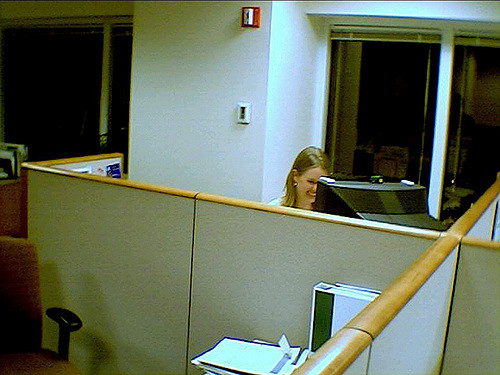Sarah Clayville
He loves her in stages. The first one begins with her favorite lilacs from behind the butcher’s shop on Walnut Street and mocha chips so she can make her special cookies for the orphanage. He didn’t even know orphanages existed anymore until he followed her from work and watched her kneel in recklessly strewn woodchips, little indentations like bruises peppering her knee caps. Mae speaks to the children like adults, eye to eye, the way others refuse to do. They swarm her, and his ears turn warm as if they’re actually swarming around him, and at home he runs his hands beneath ice water until he’s washed clean the memory of her.
Except in the morning it’s back.
The second stage is concealed beneath his jacket. A list of times and places, written quizzically, which only James can decipher. She is a creature of habit, and he withers when he walks by her cubicle and catches the scent of her perfume. He pictures the cloud as a phantasmal road map to her day. In the past month James has willingly given over his routine for hers. He doesn’t miss the heavily dosed espressos or the pull of the weights at the gym. This is satisfaction, to knowingly adopt Mae’s life for his own. She has no idea he’s given it over to her, and that makes it all the better. Her good deeds become his own. When she kneels in the confession booth and he lingers so close that no one notices his shadow over hers, he lets her release of sins rush through him, too. The practice is invisible, and it is the closest that he’s ever felt to another human being.
The third stage is a rope woven so tightly it is unbreakable. James wears it as a belt under his blue windbreaker, accompanied with a half-used roll of duct tape smashed and shoved into the pocket of his khakis. He has been carrying these artifacts for several weeks, trying to ignore them in favor of the lilacs and the perfume. This is the layer that physically hurts when he touches it. A hot poker of intention branding him a creep. A stalker. He has never been these things before Mae, always dating nice girls, pretending he sees a future with them. His coworkers call him pal and his mother sends him cards with kittens. He runs the rope against his wrists and tries to remember the rosaries he’s heard the old women at church mutter under their breaths. Mae goes so early in the morning only the grandmothers keep her company, and they have bad eyesight and poor hearing. No one will witness him slipping into the confessional booth.
Except in the morning she isn’t there.
James races to the orphanage and the gourmet food shoppe, tracing her path from her apartment to the subway and even down the park. He leans his head on the same metal fence where she watches the swans navigate their ill-fitting pond. He closes his eyes and just breathes, a thought rushing into his brain that she has been taken by someone else. It’s a giddy moment, a veil lifted, a puppet severed from its strings. He stumbles at first, feeling his bones break and reshape themselves as he walks the faster path to work. He hasn’t walked his own road in weeks.
He covers his face with his jacket in case her perfume lingers in the hallways to the third floor of the office building. James listens for the click of her heels and says a brief prayer into his palm as he pretends to cough. There is nothing but the sound of fingers slipping across keyboards and the air conditioning moaning instructions to keep working. It is mundane and lovely, and James wipes away a tear of freedom. His office is away from the cubicle bank, around the corner flanked by two potted lemon trees that’ve never had the nerve to bear fruit. The door is open as if it’s waiting for James, and he skips inside, landing in his chair and fumbling through his pockets to toss the duct tape into the recycling bin. He has faith that it can be used for better things.
“James,” her voice lilts. “I don’t know that we’ve met.”
The fourth stage is forgiveness. He forgives her for surprising him, and managing without tape or rope to bind him to his chair as she leans down on his desk, speaking to him as a child, looking him in the eye. He is paralyzed.
“Mr. McCann mentioned you’d been experiencing some anxiety. A few missed reports. Things that frankly,” she winks and her eyelashes fan a cool thought under his skin, “aren’t so important. I’m transitioning to the HR department. I got my Masters last year in office therapy. It’s a new initiative, meditation and stress relief. I even came in early to prepare a plan for you.”
She lays the plan in front of him, the suggestions and paths he can take, when really, the only path he’s planned for would have landed Mae covered like a blanket with the layers of his love. She sacrificed her morning for him, her confessions and her own meditation at the park. She is giving up her life for his, whether she knows it or not.
Sarah Clayville is a high school writing teacher and freelance editor. Her fiction, nonfiction, and poetry have been published in such journals as The Threepenny Review, StoryChord, Central PA Magazine, and Mothers Always Write, among others. She is currently at work on a young adult novel and a short story collection. Find more of her writing at SarahSaysWrite.com or follow her on Twitter at @sarahsayswrite.



